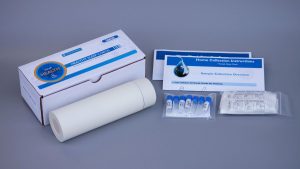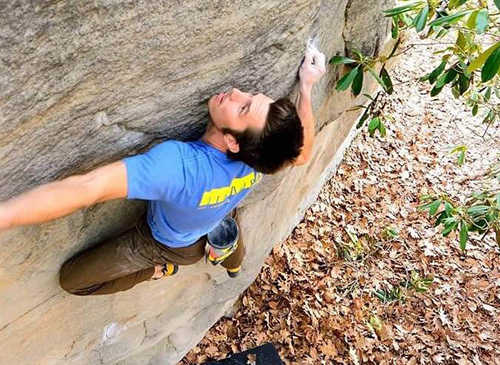By Holly Riddle

Salimetrics’ new at-home assessment provides crucial biological data to those suffering from sleep disorders. (Photo: Provided)
The last time HappyValley Industry caught up with Salimetrics, the company and leader in salivary bioscience was hard at work developing game-changing, saliva-based, Covid-19 antibody tests. Since then, the team, with its offices in Innovation Park and California, launched two, research-use-only Covid-19 antibody tests, before turning to another issue, one that impacts as many as 70 million U.S. adults: poor sleep.
A game-changing new offering
Earlier this year, Salimetrics expanded its Clinical Laboratory Improvement Amendments (CLIA) certification to enable the company to receive saliva samples from 49 states for high-complexity testing. CLIA certification ensures test result accuracy, reliability and timeliness for patients, regardless of where a medical test might be performed. While, according to a recent release from the company, Salimetrics has maintained a CLIA-certified lab since 2001, recent increases in clinically focused saliva testing drove Salimetrics to increase its ability to support this need, while focusing on better methods for collection, handling, transport and testing of quality saliva samples.
As a result of this early-2022 CLIA expansion, Salimetrics was able to focus on a new offering that could be a significant game-changer for patients struggling to find a diagnosis for sleep-related illnesses.
“We put together an at-home kit to check your sleep health. It allows people to test melatonin levels in saliva to see if there is an issue with the timing or amounts of natural melatonin production as a way to find out a solution to common sleep problems,” explained Steve Granger, Ph.D., chief scientific officer at Salimetrics.
“Right now, an evening melatonin sample set is available for Dim Light Melatonin Onset, or DLMO, but we’re coming out with different protocols to measure other phases, such as Dim Light Melatonin Offset and 24-Hour Circadian Phase Mapping,” Granger added. “Normally, in the evening, your melatonin starts to rise after sunset when you enter dim light conditions. In normal people, this prepares their body for sleep. If you have a sleep disorder or a circadian rhythm issue, the rise of melatonin could be delayed [or] advanced, or might not even happen at all. This test helps people figure out, biologically, what their body is doing before bedtime that could impact their sleep cycle.”
This isn’t Salimetrics’ first foray into the world of sleep, though. The company launched a melatonin assay in 2013 and began working with sleep researchers, of whom many noted the need for a dim light melatonin onset or circadian phase test for use both in research and in the real world, to help inform doctors on what might be contributing to dysregulation of the sleep cycle.
Getting from there to the current circadian phase assessment kit, which is now available for anyone to order online, required that CLIA expansion, so Salimetrics could work with patients in more locations, as well as internal changes to assure HIPAA compliance. The company also conducted testing for shipping the assessment kits, which required creating “a whole new system for managing the transport of samples,” said Granger.
The kit just launched earlier this year.
“There’s really no comparison”
While anyone can purchase the circadian phase assessment kit with no need for a doctor’s order, Granger does say the results aren’t going to be very meaningful for those who aren’t educated on how to read them. However, patients can ask their doctors to visit the kit’s dedicated website, biologyofsleep.com, where they can learn more about the service, register to become a provider or refer patients.
Once a kit is ordered, the kit is shipped directly to the patient’s home within a few days. Patients then collect saliva samples and send their samples back to Salimetrics in the provided pre-labeled shipping box.
“The test itself is pretty easy,” said Granger. “The standard protocol is to collect one sample every hour for seven hours. However, based on your sleep schedule or symptoms, the doctor may alter the protocol. Sample collection is generally only a five-minute process or less, depending on how much saliva you produce naturally. However, in most cases, it’s important to maintain a dim light state during the collection process, so it’s usually best if you have all the doors and blinds closed and you’re not turning on a bunch of lights and things like that.”
He continued, “That’s because melatonin is responsive to light. If you walk into a bright light, it’s going to suppress your melatonin levels, so you’ll get an artificial drop in that sample.”
Prior to the development of this at-home kit, patients seeking the same type of data would typically need to visit a sleep lab for an overnight sleep study. Salimetrics’ new solution makes obtaining those test results much easier and much more comfortable. Patients don’t typically need to stay up overnight to collect their saliva samples, even though sample collection is performed over several hours. Instead, the standard protocol is to start five hours before your normal bedtime and only requires you to stay up one hour later than normal.
“Compared to your other options, understanding a person’s DLMO can serve as a critical screening tool in diagnosing and treating sleep issues. Determining the timing of the melatonin onset and the amplitude of bedtime melatonin levels can be used in combination with self-reported behavioral sleep phase information and wearable sleep monitors for a more comprehensive patient sleep evaluation,” said Granger.
After the saliva samples are sent to Salimetrics, the company returns results within 7 to 10 business days.
Looking to the future, Salimetrics is still fine-tuning its sleep products, including creating an option that patients can use in the morning versus at night and creating extra resources to make the testing process even simpler for patients.
Learn more about Salimetrics’ healthy sleep circadian phase assessment kit at biologyofsleep.com.





